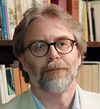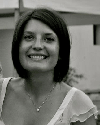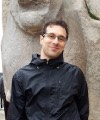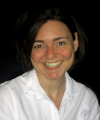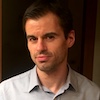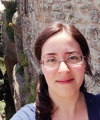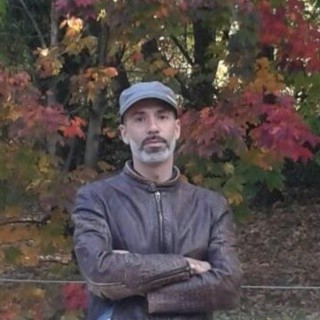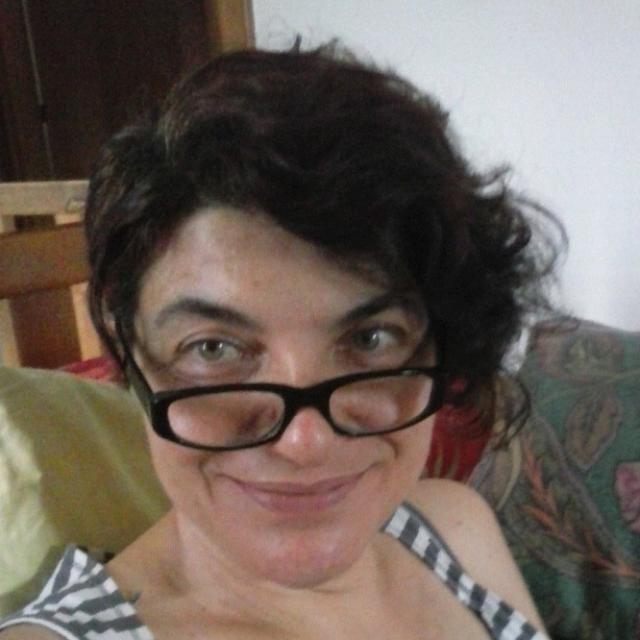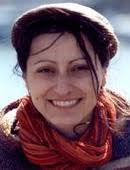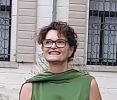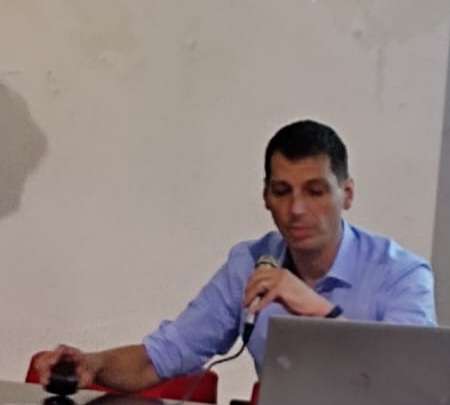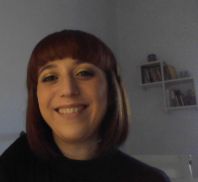Studying at the University of Verona
Here you can find information on the organisational aspects of the Programme, lecture timetables, learning activities and useful contact details for your time at the University, from enrolment to graduation.
Academic calendar
The academic calendar shows the deadlines and scheduled events that are relevant to students, teaching and technical-administrative staff of the University. Public holidays and University closures are also indicated. The academic year normally begins on 1 October each year and ends on 30 September of the following year.
Course calendar
The Academic Calendar sets out the degree programme lecture and exam timetables, as well as the relevant university closure dates..
| Period | From | To |
|---|---|---|
| CuCi IA | Sep 21, 2020 | Oct 31, 2020 |
| CuCi IB | Nov 9, 2020 | Jan 9, 2021 |
| CuCi IIA | Feb 15, 2021 | Apr 1, 2021 |
| CuCi IIB | Apr 14, 2021 | May 29, 2021 |
| Session | From | To |
|---|---|---|
| sessione d'esame invernale CuCi | Jan 11, 2021 | Feb 13, 2021 |
| sessione d'esame estiva CuCi | Jun 7, 2021 | Jul 24, 2021 |
| sessione d'esame autunnale CuCi | Aug 23, 2021 | Sep 18, 2021 |
| Session | From | To |
|---|---|---|
| sessione di laurea invernale 19-20 | Apr 7, 2021 | Apr 13, 2021 |
| sessione di laurea estiva 20-21 | Jul 5, 2021 | Jul 10, 2021 |
| Sessione autunnale di laurea a.a. 2020/21 | Nov 8, 2021 | Nov 13, 2021 |
| Sessione straordinaria di laurea a.a. 2020/21 | Mar 28, 2022 | Apr 2, 2022 |
| Period | From | To |
|---|---|---|
| Festa di Ognissanti | Nov 1, 2020 | Nov 1, 2020 |
| Chiusura Ateneo ponte Immacolata | Dec 7, 2020 | Dec 7, 2020 |
| Festa dell'Immacolata | Dec 8, 2020 | Dec 8, 2020 |
| Vacanze di Natale | Dec 24, 2020 | Jan 6, 2021 |
| Vacanze di Pasqua | Apr 2, 2021 | Apr 6, 2021 |
| Festa della liberazione | Apr 25, 2021 | Apr 25, 2021 |
| Festa del lavoro | May 1, 2021 | May 1, 2021 |
| Festa del Santo Patrono | May 21, 2021 | May 21, 2021 |
| Sospensione delle lezioni | May 22, 2021 | May 22, 2021 |
| Festa della Repubblica | Jun 2, 2021 | Jun 2, 2021 |
| Vacanze estive | Aug 9, 2021 | Aug 15, 2021 |
Exam calendar
Exam dates and rounds are managed by the relevant Culture and Civilisation Teaching and Student Services Unit.
To view all the exam sessions available, please use the Exam dashboard on ESSE3.
If you forgot your login details or have problems logging in, please contact the relevant IT HelpDesk, or check the login details recovery web page.
Academic staff

Bassetti Massimiliano
 massimiliano.bassetti@univr.it
massimiliano.bassetti@univr.it
 045802 8376
045802 8376
 riccardo.bertolazzi@univr.it
riccardo.bertolazzi@univr.it
 francesco.bianchi@univr.it
francesco.bianchi@univr.it
 evita.calabrese@univr.it
evita.calabrese@univr.it
 piergiovanna.grossi@univr.it
piergiovanna.grossi@univr.it
 elisa.lerco@univr.it
elisa.lerco@univr.it
 francesco.lupi@univr.it
francesco.lupi@univr.it
Maganuco Anna Maria Grazia Rita
 anna.maganuco@univr.it
anna.maganuco@univr.it

Mastrocinque Attilio
 attilio.mastrocinque@univr.it
attilio.mastrocinque@univr.it
 +39 045802 8386
+39 045802 8386
 giulia.pedrucci@univr.it
giulia.pedrucci@univr.it
 giulia.perosa@univr.it
giulia.perosa@univr.it
 dino.piovan@univr.it
dino.piovan@univr.it

Pisaniello Valerio
 valerio.pisaniello@univr.it
valerio.pisaniello@univr.it
 +39 045802 8381
+39 045802 8381
 alberto.scandola@univr.it
alberto.scandola@univr.it
 massimo.scotti@univr.it
massimo.scotti@univr.it
 cecilia.sideri@univr.it
cecilia.sideri@univr.it
 carlo.vannini@accademiabelleartiverona.it
carlo.vannini@accademiabelleartiverona.it
 giovanna.zoccarato@univr.it
giovanna.zoccarato@univr.it
Study Plan
The Study Plan includes all modules, teaching and learning activities that each student will need to undertake during their time at the University.
Please select your Study Plan based on your enrollment year.
1° Year
| Modules | Credits | TAF | SSD |
|---|
1 module to be chosen among the following2° Year activated in the A.Y. 2021/2022
| Modules | Credits | TAF | SSD |
|---|
Latin literature (i)
2 modules to be chosen among the following1 module to be chosen among the following2 modules to be chosen among the following3° Year activated in the A.Y. 2022/2023
| Modules | Credits | TAF | SSD |
|---|
2 modules to be chosen among the following1 module to be chosen among the following1 module to be chosen among the following| Modules | Credits | TAF | SSD |
|---|
1 module to be chosen among the following| Modules | Credits | TAF | SSD |
|---|
Latin literature (i)
2 modules to be chosen among the following1 module to be chosen among the following2 modules to be chosen among the following| Modules | Credits | TAF | SSD |
|---|
2 modules to be chosen among the following1 module to be chosen among the following1 module to be chosen among the following| Modules | Credits | TAF | SSD |
|---|
Legend | Type of training activity (TTA)
TAF (Type of Educational Activity) All courses and activities are classified into different types of educational activities, indicated by a letter.
Type D and Type F activities
| years | Modules | TAF | Teacher |
|---|---|---|---|
| 1° 2° 3° | Dialogoi. Interdepartmental seminar on the texts of philosophy and ancient literature | F |
Gherardo Ugolini
(Coordinator)
|
| 1° 2° 3° | Fondamenti per introduzione allo studio del linguaggio | F |
Federico Righi
(Coordinator)
|
| 1° 2° 3° | Giornata mondiale della poesia | F |
Arnaldo Soldani
(Coordinator)
|
| 1° 2° 3° | The Unesco World Heritage Sites | F |
Silvana Bianchi
(Coordinator)
|
| 1° 2° 3° | Il testo en abyme: rappresentazioni della scrittura nell’Europa romantica - Convegno internazionale del CRIER - 5-6 novembre 2020 | F |
Corrado Viola
(Coordinator)
|
| 1° 2° 3° | Intercomprehension laboratory between the Romance languages | F |
Alessandra Zangrandi
(Coordinator)
|
| 1° 2° 3° | Laboratory to introduce the study of Ancient Greek | F |
Dino Piovan
(Coordinator)
|
| 1° 2° 3° | Books and writings of the Greek world | F |
Paolo Scattolin
(Coordinator)
|
| years | Modules | TAF | Teacher |
|---|---|---|---|
| 1° 2° 3° | The origins of Christianity | F |
Giannattilio Bonifacio
(Coordinator)
|
| years | Modules | TAF | Teacher |
|---|---|---|---|
| 1° 2° 3° | Convegno su carlo gozzi nel terzo centenario della nascita | F |
Nicola Pasqualicchio
(Coordinator)
|
| 1° 2° 3° | Dialogoi. Interdepartmental seminar on the texts of philosophy and ancient literature | F |
Gherardo Ugolini
(Coordinator)
|
| 1° 2° 3° | Fondamenti per introduzione allo studio del linguaggio | F |
Federico Righi
(Coordinator)
|
| 1° 2° 3° | Intercomprehension laboratory between the Romance languages | F |
Alessandra Zangrandi
(Coordinator)
|
| 1° 2° 3° | Laboratory to introduce the study of Ancient Greek | F |
Dino Piovan
(Coordinator)
|
| 1° 2° 3° | Laboratorio di metrica italiana | F |
Giovanna Zoccarato
(Coordinator)
|
| 1° 2° 3° | Books and writings of the Greek world | F |
Paolo Scattolin
(Coordinator)
|
| years | Modules | TAF | Teacher |
|---|---|---|---|
| 1° 2° 3° | The origins of Christianity | F |
Giannattilio Bonifacio
(Coordinator)
|
| years | Modules | TAF | Teacher |
|---|---|---|---|
| 1° 2° 3° | Antifascismo/i, un percorso in quattro profili | F |
Renato Camurri
(Coordinator)
|
| 1° 2° 3° | Lectures "Musiche/Culture/Civiltà" | F |
Vincenzo Borghetti
(Coordinator)
|
| 1° 2° 3° | Dialogoi. Interdepartmental seminar on the texts of philosophy and ancient literature | F |
Gherardo Ugolini
(Coordinator)
|
| 1° 2° 3° | Educational workshop on bibliotherapy | F |
Marco Dalla Valle
(Coordinator)
|
| 1° 2° 3° | Laboratory of photo | F |
Carlo Vannini
(Coordinator)
|
| 1° 2° 3° | Intercomprehension laboratory between the Romance languages | F |
Alessandra Zangrandi
(Coordinator)
|
| 1° 2° 3° | Laboratory to introduce the study of Ancient Greek | F |
Dino Piovan
(Coordinator)
|
| 1° 2° 3° | Workshop on akkadian language | F |
Simonetta Ponchia
(Coordinator)
|
| 1° 2° 3° | Opera Workshop | F |
Nicola Pasqualicchio
(Coordinator)
|
| 1° 2° 3° | Language and culture of Ancient Anatolia and the Hittites | F |
Federico Giusfredi
(Coordinator)
|
| years | Modules | TAF | Teacher |
|---|---|---|---|
| 1° 2° 3° | Attivita' FAI | F |
Monica Molteni
(Coordinator)
|
| 1° 2° 3° | Workshop on Latin texts translation | - |
Renata Raccanelli
(Coordinator)
|
| 1° 2° 3° | Workshop on Latin texts translation | - |
Renata Raccanelli
(Coordinator)
|
| 1° 2° 3° | Latin Prosody exercises | - |
Paolo De Paolis
(Coordinator)
|
| 1° 2° 3° | Organizzazione e stesura della tesi triennale su temi letterari | - |
Giuseppe Sandrini
(Coordinator)
|
Indo-European Linguistics (p) (2021/2022)
Teaching code
4S01236
Teacher
Coordinator
Credits
6
Language
Italian
Scientific Disciplinary Sector (SSD)
L-LIN/01 - HISTORICAL AND GENERAL LINGUISTICS
Period
2 A dal Feb 14, 2022 al Mar 26, 2022.
Learning outcomes
The Historical Linguistics is dealing with a diachronic perspective of the study of the human language, i.e. with the language change through the time. This course consists in an introduction to the study of the Ancient Indo-European languages, their cultures, the history of their discovery, and the methodological approaches, the language change discussed on the different levels of analysis. The comparative method to reconstruct the mother tongue of this family, further the comparison and reconstruction of the phonological and morphological structure of the different Indo-European languages together with the illustration of the most important phonetic and laws, furthermore, of the of the word formation and derivation, finally a brief introduction to the Indo-European culture and realia are the main topics of the course.
Program
Programm
At the end of the course the student will be able to:
1. Illustration of the concept of a linguistic family, in particular the Indo-European one
2. Historical, comparative and reconstructive method in ‘800 and in '900
3. History of the discipline
4. Concepts and principles of linguistic change
5. Exemplification of the language changes and characteristics through the analysis on the different levels:
5a. phonetic
5b. morphological and syntactical
5c. of the lexicon of the individual Indo-European languages, with specific reference to Latin and Greek.
6. Illustration of Indo-European culture based on hereditary vocabulary, realia and the history of the discipline.
References:
Campanile, E. “Antichità indoeuropee”, in: Le lingue indoeuropee, Giacalone Ramat, A.-Ramat, P. (a cura di), Bologna 1994, pp. 19-43.
Lehmann W.P., La linguistica indoeuropea, Mulino
Villar, F., Gli indoeuropei e le origini dell’Europa, Mulino.
Watkins, C. “Il proto-indoeuropeo”, in: Le lingue indoeuropee, Giacalone Ramat, A.-Ramat, P. (a cura di), Bologna 1994, pp. 45-93.
In addition to the mandatory texts for the exam, the student can take advantage of the following in-depth texts that also apply to any oral exam to be requested after the written exam:
- scripts by the teacher,
- materials available on the platform
- exercises.
Examination Methods
Oral examination, preceded by the presentation of a paper about a word etymology from a chosen language.
The objective of the exam is
- to verify the acquired knowledge of the topics of the course;
- to verify the ability to re-elaborate and deepen the material of the course.
The objective of the examination is to verify the level of achievement of the previously indicated educational objectives.
The exam consists in the preparation and presentation of a brief etymological research of a word chosen by the student.
The questions of the oral exam allow to apply the acquired knowledge on the historical and comparative method, on the reconstruction of the proto-language, on the phonetic laws that mark the phonetic change of the different languages, on the analysis of morphological nominal and verbal categories.
During the exercises some examples of research are presented etymological and exercise the phenomena of change, especially phonological.
The class is a preparation course for a better understanding to the Master class Comparative Grammar of the Indo-European languages.
Career prospects
Module/Programme news
News for students
There you will find information, resources and services useful during your time at the University (Student’s exam record, your study plan on ESSE3, Distance Learning courses, university email account, office forms, administrative procedures, etc.). You can log into MyUnivr with your GIA login details: only in this way will you be able to receive notification of all the notices from your teachers and your secretariat via email and also via the Univr app.
Graduation
List of thesis proposals
| theses proposals | Research area |
|---|---|
| tesi di Glottologia, Storia comparata, Linguistica storica | ENGLISH LANGUAGE - Grammar and Syntax – Grammatik und Syntax |
| tesi di Glottologia, Storia comparata, Linguistica storica | GERMANIC LANGUAGE - Dialectology - Dialektologie |
| tesi di Glottologia, Storia comparata, Linguistica storica | HUMANITIES & SOCIAL STUDIES - HUMANITIES & SOCIAL STUDIES |
| tesi di Glottologia, Storia comparata, Linguistica storica | Indo-European languages & literatures - Indo-European languages & literatures |
| tesi di Glottologia, Storia comparata, Linguistica storica | LINGUISTICS - LINGUISTICS |
Gestione carriere
Linguistic training CLA
Student mentoring
Requisiti classi di abilitazione insegnamento
Requisiti necessari per accedere alle classi di abilitazione per l'insegnamento.
vedi allegato pdf
Inoltre, per informazioni sui 24 CFU nelle discipline antropo-psico-pedagogiche e nelle metodologie e tecnologie didattiche, si veda -> LINK
Documents
| Title | Info File |
|---|---|
|
|
pdf, it, 307 KB, 30/11/21 |
Student login and resources
Modalità e sedi di frequenza
La frequenza non è obbligatoria.
Maggiori dettagli in merito all'obbligo di frequenza vengono riportati nel Regolamento del corso di studio disponibile alla voce Regolamenti nel menu Il Corso. Anche se il regolamento non prevede un obbligo specifico, verifica le indicazioni previste dal singolo docente per ciascun insegnamento o per eventuali laboratori e/o tirocinio.
È consentita l'iscrizione a tempo parziale. Per saperne di più consulta la pagina Possibilità di iscrizione Part time.
Le sedi di svolgimento delle lezioni e degli esami sono le seguenti:
- Polo Zanotto (vicino si trova il Palazzo di Lettere)
- Palazzo ex Economia
- Polo Santa Marta
- Istituto ex Orsoline
- Palazzo Zorzi (Lungadige Porta Vittoria, 17 - 37129 Verona)








